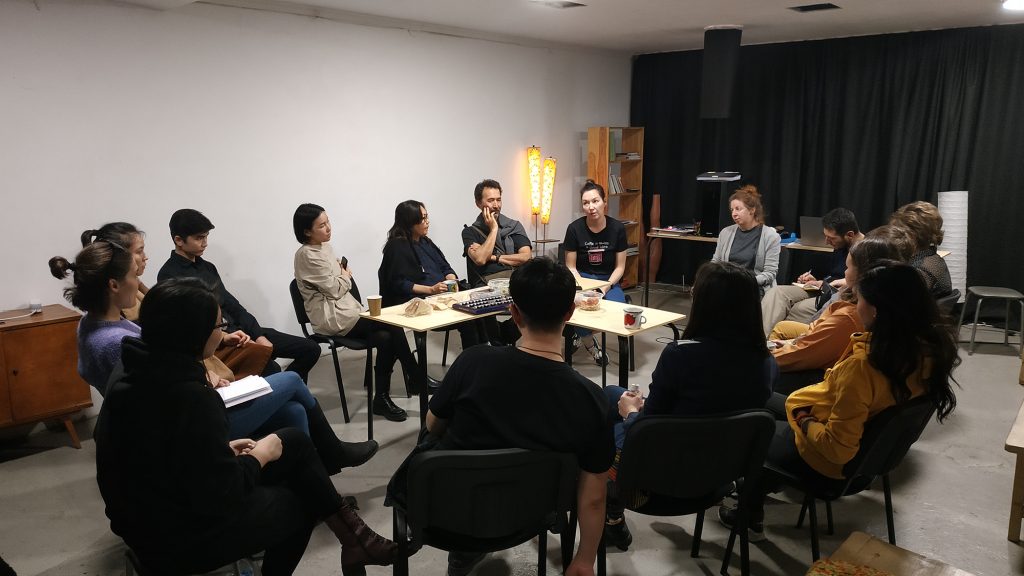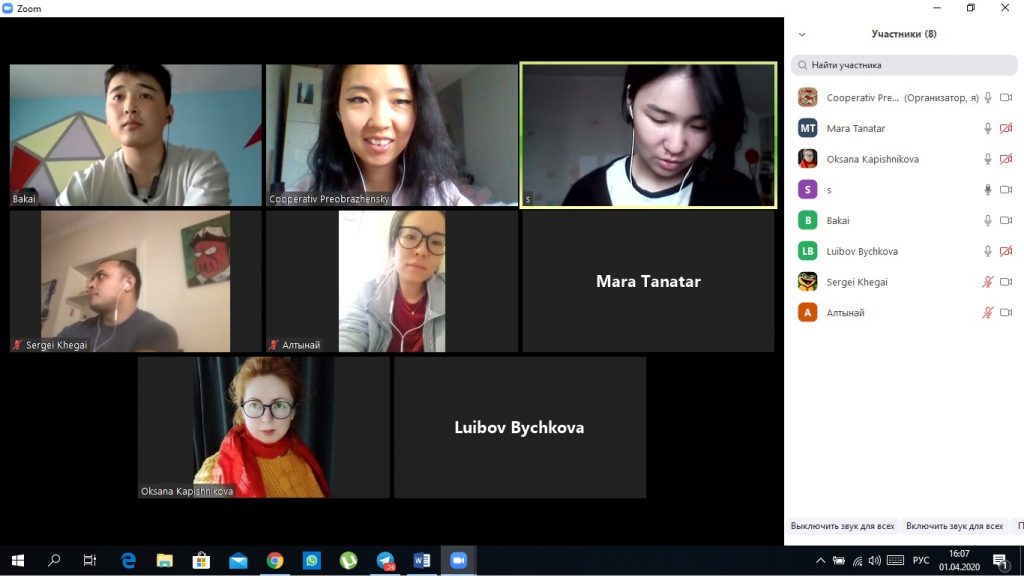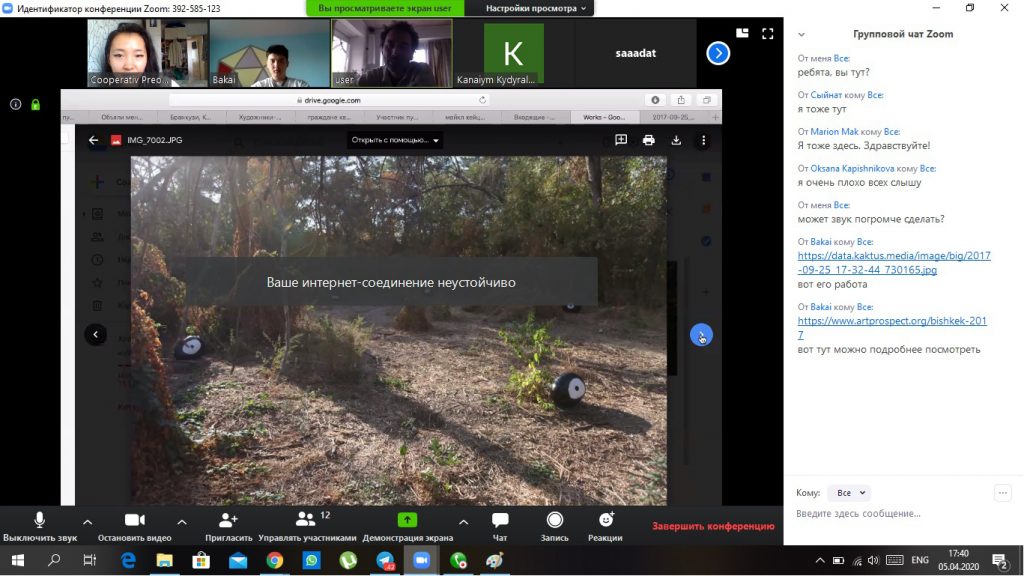School-In-Isolation
April, 2020
Isolated in Bishkek
—
bermet borubaeva
Kyrgyzstan is a small country of the post-soviet bloc, impacted by corruption, where one third of the population lives at or below the poverty line. Many people live day-to-day without savings, on as little as $30-$50 USD per month, and there is no governmental support for low-income families. One third of the GDP derives from the wages of workers who have migrated to Russia to earn money to send home to their families in Kyrgyzstan. Intellectual workers, freelancers and artists face similar issues as other vulnerable workers as their employment is often precarious and irregular, with income often dependent on foreign grants and international projects.
Kyrgyzstan went into isolation mode after confirmation that three pilgrims who came back from Saudi Arabia on 12 March 2020 tested positive for COVID-19. Very soon all schools, universities, and private companies (except for enterprises of strategic supply, shops, pharmacies) were closed and transformed for distant work. The government declared a State of Emergency and closed the borders. People were only allowed to go to shops and pharmacies during the day, with a night-time curfew from 8pm to 7am until 14 April, however this has now been extended until the end of April.
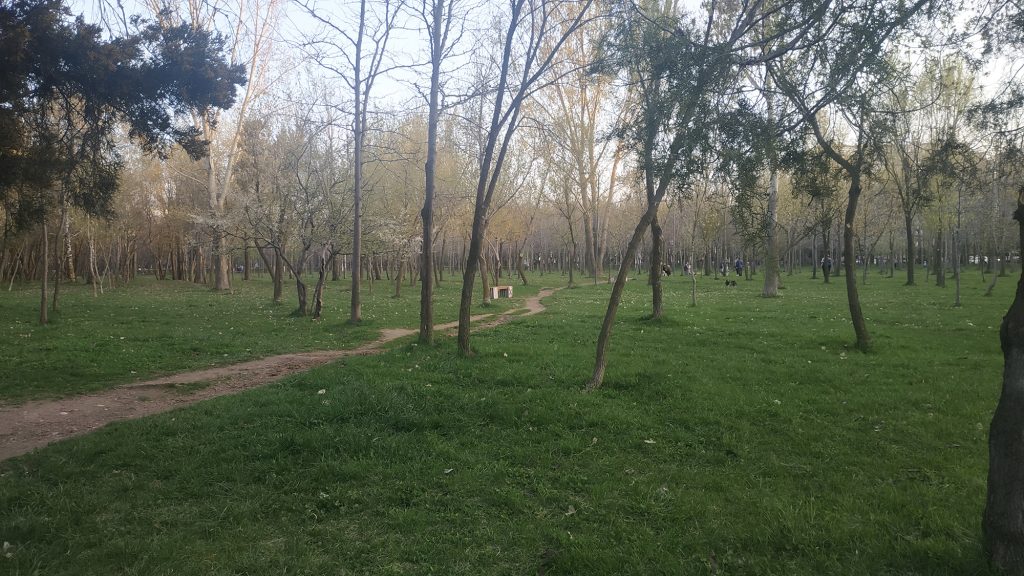
Visiting the park for some exercise. The sports parks in Bishkek are almost empty. 4.4.2020
In the beginning there was some kind of euphoria, people were not used to sitting at home and not going to work and school – usually this is only possible during New Year vacations when, for one week, we stay at home most of the time, meet with friends, eat and drink. But this is not Happy New Year and Christmas time.
Most of the time, workers are busy at work and don’t have the opportunity to stay home with their families and dedicate time to reading books, hobbies or cleaning. I think it would be nice if people had access to a universal basic income for this period and could just use the time to reboot.
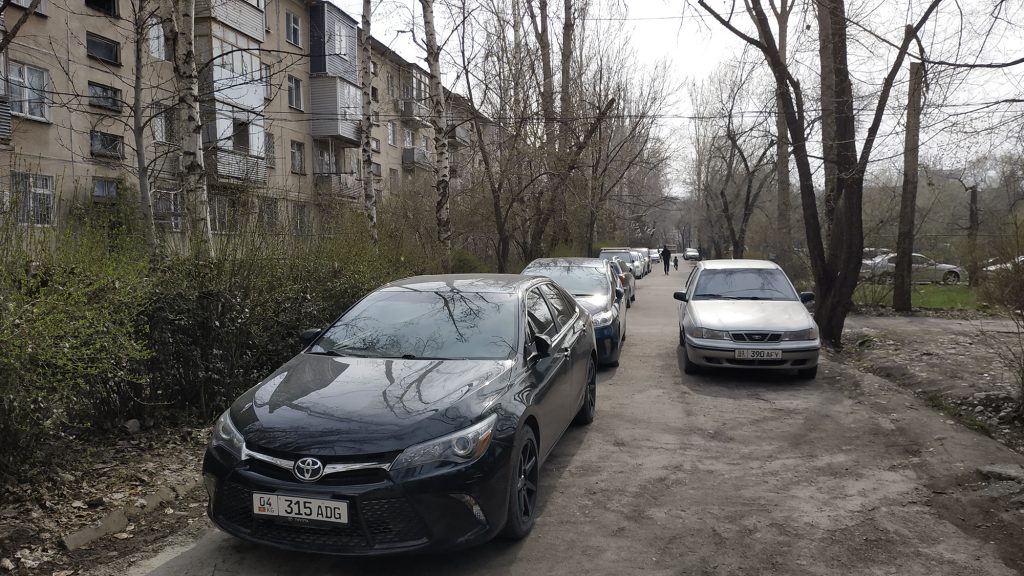
The parking spaces near my apartment are full. Everyone sits at home. 24.3.2020
I had been very busy for the past six months, including exhibitions, many street rallies, protests and rights protection activities. And in one moment it all stopped. It was as though almost everything I was working for as an arts professional or activist became useless somehow. I had no idea how to behave, what to do, and how I could help. Initially, I was just travelling along the tracks as I had before, working on current projects as if nothing had changed, even though I knew this route had already been disconnected. I find it difficult to be optimistic about the current situation – without a universal basic income and with the corruption of the government, I feel it is impossible to solve this situation adequately to avoid a deep human crisis.
For the past 7 years I lived in Moscow but returned to Bishkek for the exhibition “Death. Yearning. Love” by Laboratory CI that opened in November 2019. During my stay in Bishkek, I attended the Conference of Green Mobility, where I learned that Bishkek had the highest air pollution rating in the world, which lead to my decision to move back to Bishkek and join the Green Party and run in the parliamentary elections in October. I was also aware that there was no plan for a new group of students in the ArtEast School of Contemporary Art, so I decided to take on the role of coordinator to ensure that the school would continue.
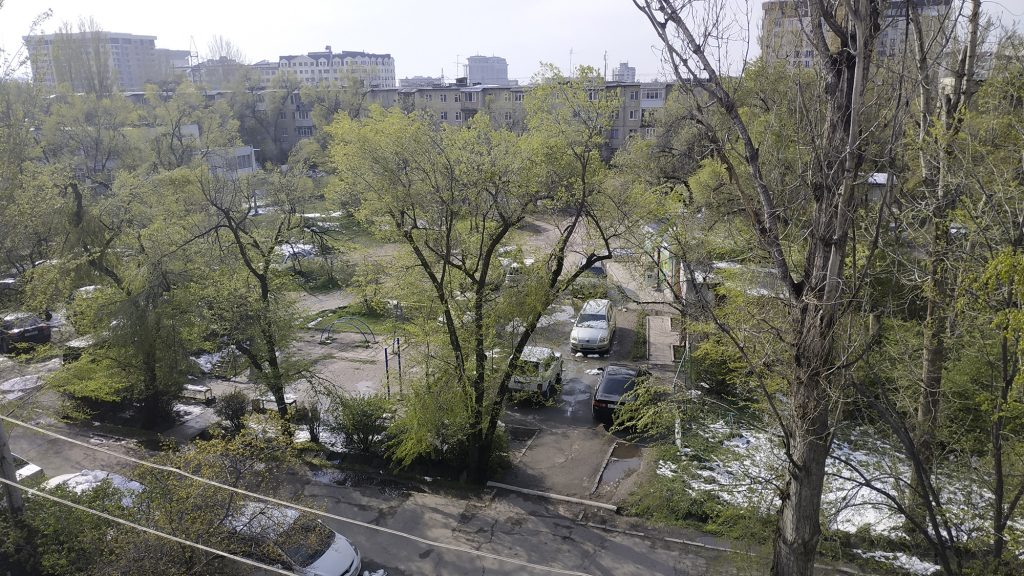
The view from my apartment window. 10.4.2020
ArtEast was founded in 2002 by Gulnara Kasmalieva and Muratbek Djumaliev founded, with the aim of developing the contemporary art scene in Central Asia in various ways, including through the curation of international exhibitions and arts festivals, creating artworks, and conducting educational projects. ArtEast’s School of Contemporary Art launched in 2009 and I was part of the first group of students to attend. The school was non-formal, with the aim of providing an introduction to art history and expanding the worldview of students. After graduating, we did many projects together, with some of the students moving into filmmaking, design etc, and some founding their own institutions.
My desire to keep the school going was inspired by research that took place during the What Could Should Curating Do? curatorial program in Belgrade last year, when I was a participant of the program. The research focused on the informal education program “School of History and Theory of Images” that was initiated 20 years ago in Belgrade by curators and theoreticians and made a huge impact on the art scene. Thinking about this school, I realised how important it is to keep art schools and programs running.
This year, the school evolved to include a curatorial team consisting of the founders and a number of graduates and their own platforms – Gulnara Kasmalieva and Muratbek Djumaliev (founders), Alima Tokmergenova and Oksana Kapishnikova (ArtBus), Kanaiym Kydyralieva, Ravshan Ta Djing, Diana Ukhina (Laboratoria CI), Nellya Djamanbaeva (Capacity Building Foundation) and Bermet Borubaeva (Cooperative PreobraZHenskiy). We even had three spaces to conduct classes in – the underground space of Laboratory CI, the ArtEast Studio, and our partners Ololohouse. We had lessons every Sunday, lasting between 3-5 hours, with sandwiches, fruits and sweets, and, several times, someone cooking for the group. It is an ArtEast school tradition to gather and celebrate holidays together. We had planned to organise an informal party in the style of Dada but were not able to do so before the quarantine began.
As we do not have any governmental or non-governmental educational institutions in the sphere of contemporary art and culture the school is very important for the region. We do not receive any state funding, asking students to pay a small fee (approx. $70USD for the whole 5-month program) to cover basic expenditures, which gives us the opportunity to keep the school autonomous and to continue without any grants.
This year’s group of students were excited to be learning about contemporary art. Some of our students had a background in art, while others did not, but we saw this as a good thing as we wanted to have a multidisciplinary program. Among the students we have musicians, an IT specialist, architects, designers, a Yoga trainer, criminalist, feminists and urban activists, anthropologist, teacher, philosopher and even medical worker. We had a really nice atmosphere every time we met, with students involved in a number of projects before the quarantine began, such as the exhibition-protest #BishkekSmog 20.02.2020 against air pollution, in front of Parliament House. Some of the students were involved in working on an exhibition to take place inside a bus, called “Kiyinky Aiyaldama” (“Next Station” in Kyrgyz language), curated by student Rada Valentina Kyzy and two curators of the course – myself and Oksana Kapishnikova. We had permission from the city Mairie, had selected works through an open-call, and had the opening planned for March 29. The exhibition has been postponed, rather than being moved online. For the ArtEast School it was tradition to make informal parties together, celebrating New Year or other events and we, with the students, had planned to make a party in the style of Warhol’s Factory or Surrealist’s dreams, but has not been able to happen yet.
For the School, we made the decision to shift to an online format even before isolation officially started, after the students requested this, and in order to provide security for everyone. The first online session of the school was extremely complicated as nobody was used to such a format – the noises, the order for people to speak, lack of eye-contact and direct attention for speakers, microphones switched off, people out of visibility of their cameras, and so on. However, one of the positives to come out of this new format is the possibility of inviting guests from other countries to participate in the school and conduct lectures and discussions. Knowing this, we added a fourth topic to the program. In addition to Modern Art, Contemporary Art and Contemporary Art in Central Asia, we have added Meetings with International Curators and Theoreticians. In this way, we have been able to move beyond the borders, even when the borders are closed.
The question of one of our students – what is the final result of our school now? – is very poignant. We have very little understanding of how things will be after all of this ends – what the role of artists will be, how they will be able to impact society etc. But for the moment, all we can do is develop our imagination and use a critical approach. We had planned, as the final stage of the achool program, for students to participate in our Festival of Public Art, “TRASH III”, dedicated to environmental pollution, and held in the ‘Straw-bricks Belt’ of Bishkek’s Novostroikas, where there is no infrastructure or arts events. As part of this, we planned to hold a workshop-laboratory event called “Art of Co-participation”, conducted by Anton Valkovsky (a curator from Volgograd/Berlin). He has said that it’s better to conduct this workshop offline, rather than trying to change it for an online platform, and so we have postponed the workshop and the festival for an indefinite period.
Another ArtEast project is the construction of an energy-efficient Residency building at the famous lake Issyk-kul, working with local community. It is important for our ArtEast community to decentralize art practices and run projects outside the capital. Spring is the time to plant trees, to work with the earth, to mobilize the community and collaborate in these ways. We had also discussed plans to organise students to hold some workshops or a festival at the lake. But now the road to the Issyk-kul region is closed and there is no possibility to work in that part of the country.
The salary from the TRASH III festival was to be my main source of income, so now I find myself with no income for the foreseeable future. I live with my family – my mom and grandmother – and my mother, a hairdresser, has almost finished working as hair salons are not allowed now. We have only pensions, which are very small in Kyrgyzstan, but we are very privileged because we have our flat that we live in. If not, it would be extremely tough now. My brother just went to Moscow to work in a taxi service to send money back, but the percentage of the promised salary is extremely low now and he has to work for Yandex.taxi (like Uber), with his earnings only covering food expenses.
There are millions of migrant workers in Russia who send money back to families in the Central Asian regions and I am very sad because it is now the only income for many Kyrgyz families and these workers will be exposed to even more exploitation than before as they try to find any job in any conditions.
There are some discussions among art practitioners in Kyrgyzstan about how isolation can affect the country in general and us. Our museums and art institutions have started to open their archives and make e-shows. Meder Akhmetov from ‘Studio Museum’ suggested to open an e-gallery to support artists. Many art practitioners are just staying calm and working on their projects waiting for when the current situation ends. Some said that in such situations they think it is better to live in a country other that Kyrgyzstan – if you catch the virus here, you are almost incurable, you’re on your own and, even if you do the right thing and stay inside, there are no social guarantees or support from the State. Actually, so many people have already migrated and those who stayed were mostly those who wanted to work on developing culture, however given the current situation, maybe they will change their minds and decide to migrate too.
I cannot image that it is possible for such a large-scale pandemic to disappear in the next few months. I believe that after the quarantine period ends, people will still be afraid to go out and will remain at home if possible, so many online activities will continue. Even now, activity in Bishkek has not completely stopped – someone has started online art challenge and online art schools, such as the School of Artistic Gesture in Kazakhstan. We have even had our first experience of an online exhibition – our annual event, 1st April Art Competition – where works were exhibited online and the jury even published a play-discussion of the selection process in a Whatsapp chat group
As for me, my life has not really changed a lot except that I am not going out. Work is progressing, there is still a schedule of meetings (albeit e-meetings) and the same deadlines, and so I just keep going. I will continue to work on my art ideas and now just have more time to write the concept and programs, apply for financing and find partners. I believe more now in what I am doing in art and my other activities in relation to drawing attention to global risks of environment pollution. I would like to experience more live practices in art like gardening or cooking, cooperating, saving. The dream is to create space as a prototype for an alternative way of living, and perhaps now, for the next half a year at least, we can start to build this platform.
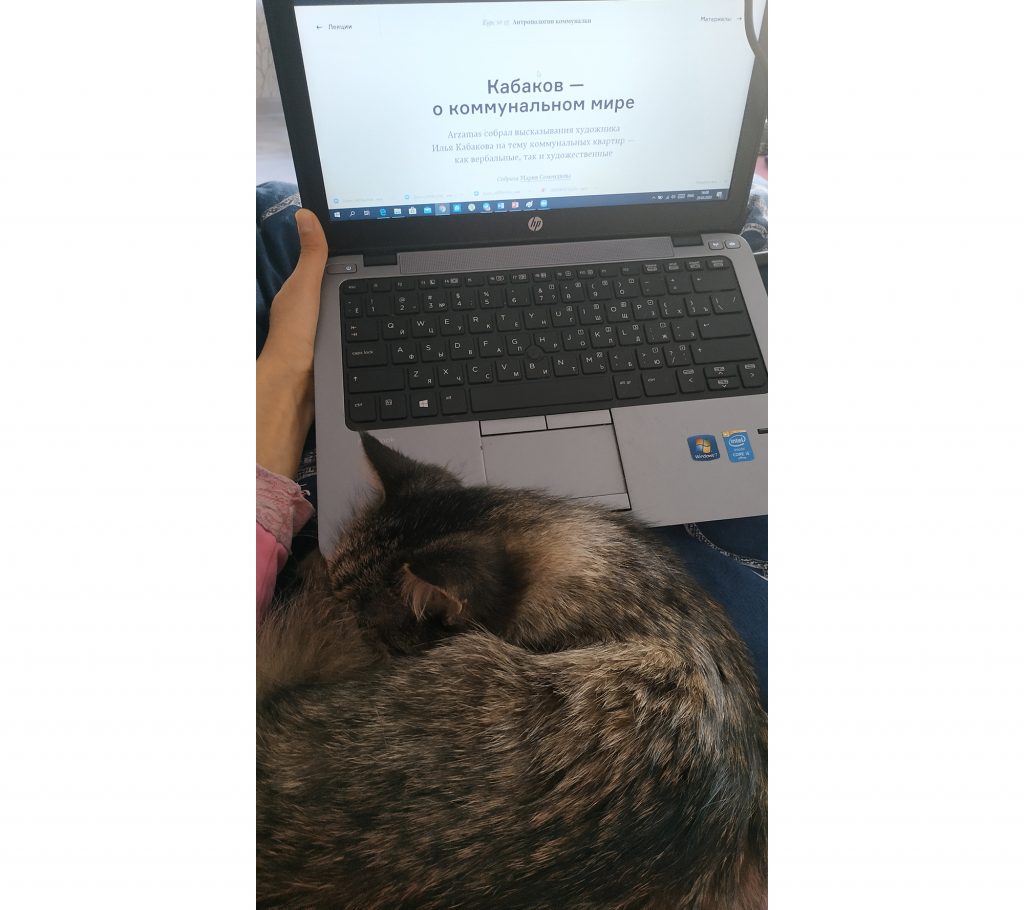
Class preparation involves a special guest now. 29.3.2020
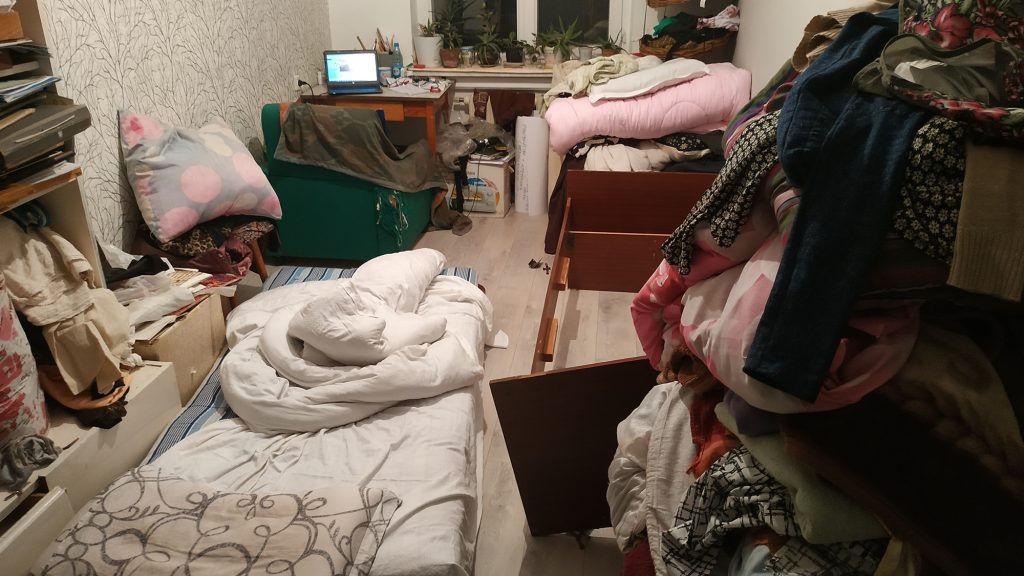
I have also started home improvements, which are going very slowly. 6.4.2020
Bermet Borubaeva is an artist and activist from Bishkek, Kyrgyzstan.

